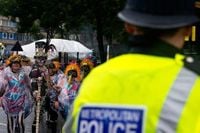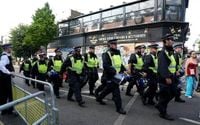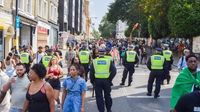For the first time, the Metropolitan Police Service will deploy live facial recognition (LFR) technology at the Notting Hill Carnival this August Bank Holiday weekend, aiming to curb the violent crime that has marred the event in recent years. The cameras will be strategically placed on the approaches to and exits from the carnival, but notably not within the event's boundaries, to identify individuals who pose a public safety risk before they enter the crowded streets.
The Notting Hill Carnival, Europe’s largest street festival, draws up to two million visitors annually. While it is celebrated as a vibrant cultural gathering, recent years have seen a disturbing rise in violent incidents, including knife crimes and sexual offences. Last year alone, eight stabbings occurred over the three-day event, with one victim fatally wounded and another beaten to death.
Deputy Assistant Commissioner Matt Ward, the police commander for this year’s carnival, outlined the force’s comprehensive plan to ensure safety. He explained that the LFR cameras will scan faces against a bespoke watchlist comprising wanted offenders, missing persons—especially young people vulnerable to exploitation—and individuals subject to sexual harm prevention orders. If the system detects a match, it generates an alert, prompting officers to conduct further checks and decide whether to engage with the individual. Importantly, an alert does not automatically result in an arrest; officers exercise discretion based on the situation.
So far in 2025, the technology has been deployed 111 times across London, leading to 512 arrests. The Met emphasized that if a person passing an LFR camera is not on the watchlist, their biometric data is immediately and permanently deleted, underscoring the strict safeguards in place to protect privacy.
Alongside facial recognition, the police will implement screening arches at some of the busiest entry points to the carnival, where stop-and-search powers will be actively used to prevent the carrying of knives and other weapons. Last year, pre-emptive intelligence-led arrests and searches resulted in 160 arrests before the event, targeting possession of firearms, drug supply, rape, and other serious sexual assaults.
Deputy Assistant Commissioner Ward highlighted the scale of the police operation, with around 7,000 officers and staff deployed each day over the August Bank Holiday weekend. He acknowledged the challenge posed by the carnival’s growing popularity and size, which creates unique security demands. “Amongst the millions of carnivalists who have attended over many years there has been a tiny minority of individuals intent on causing serious harm to others,” he said. “Their actions stand in stark contrast to the traditions and values of Carnival.”
To complement law enforcement efforts, the Met is working closely with community partners, including the Elba Hope Foundation, a youth organisation led by actor Idris Elba and his wife Sabrina. This partnership focuses on diverting young people away from crime, particularly knife crime, reflecting a preventative approach that goes beyond policing alone.
The police are also collaborating with Crimestoppers, an independent charity that allows the public to report information anonymously. Crimestoppers’ iron-clad commitment to confidentiality—never asking for names or tracking IP addresses—aims to encourage community involvement in keeping the carnival safe. DAC Ward urged the public to come forward if they know of anyone planning to bring weapons or engage in violence. “In doing so, you could be saving a life,” he said.
However, the use of facial recognition technology at the carnival has sparked controversy. Campaigners and some organisers have voiced concerns about civil liberties and potential bias. Rebecca Vincent, interim director of Big Brother Watch, called the technology “particularly sinister,” highlighting worries that it is less accurate in scanning minority faces. While testing by the National Physical Laboratory found no statistically significant bias related to gender or race, false positives have been reported, and the technology’s accuracy remains a point of debate.
LFR was trialled previously at the Notting Hill Carnival in 2016 and 2017 but was abandoned after falsely flagging 102 people. Lindsey Chiswick, the national lead on facial recognition technology for the Metropolitan Police, acknowledged that the technology used then had a low accuracy rate and reassured that current systems have improved significantly.
The carnival’s chair, Ian Comfort, has highlighted the critical need for public funding to address safety concerns, emphasizing that increased investment in stewarding and crowd management is essential. In April 2025, Met Assistant Commissioner Matt Twist raised alarms about the risk of a “mass casualty event” due to crowd density, noting that crowd control remains one of the most pressing challenges for the event’s safety.
Voices within the policing and local community have suggested alternative measures, such as moving the carnival to a controlled venue like Hyde Park and implementing ticketed entry to reduce risks. Jonathan Hinder, a former police inspector, argued that such changes could eliminate stabbings and improve overall safety.
Matthew Phillip, chief executive of Notting Hill Carnival Ltd, acknowledged the impact of knife crime on the event but emphasized that the carnival itself is not the cause. “We can’t ignore the impact of knife crime on our event,” he said, referencing the tragic deaths of Takayo Nembhard and Cher Maximen, the latter killed in front of her young daughter during last year’s family day. Phillip expressed hope that the carnival could be part of the solution to knife crime through collaborative efforts.
As the August Bank Holiday weekend approaches, the Metropolitan Police’s multi-faceted approach—including the introduction of live facial recognition cameras, increased officer presence, community partnerships, and public engagement—marks a significant step in tackling the complex challenges of maintaining safety at one of London’s most cherished cultural events. Yet, the debate around privacy and civil liberties ensures that the conversation about how best to balance security and freedom will continue well beyond the carnival’s final parade.



